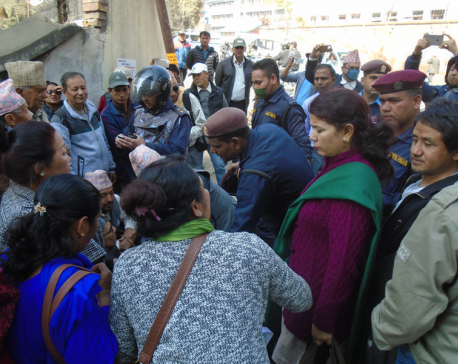
OR
Maoists observe People's War Day, victims mark Black Day
Published On: February 13, 2017 06:00 AM NPT By: Ashok Dahal | @ashokpillar
KATHMANDU, Feb 13: While various Maoist factions were commemorating their 22nd People's War Day on Sunday, conflict victims of the decade-long Maoist insurgency marked a Black Day, venting their ire against the snail-pace transitional justice process.
Over 17,000 people were killed during the armed insurgency and the whereabouts of as many as 1,500 others is still unknown. The then CPN (Maoist) launched the insurgency on February 13, 1996 (Falgun 1, 2052 BS) and the armed conflict continued for 10 years until the Comprehensive Peace Accord was signed in November, 2006.
Although two separate commissions-Truth and Reconciliation Commission (TRC) and Commission for the Investigation of Enforced Disappeared Persons (CIEDP) -- were formed to probe the conflict-era cases, they have failed to settle even a single case to date, due to lack of necessary legislation, human resources and funds from the government.
The TRC, which is mandated to investigate conflict-era crimes and human rights violations, has received a total of 58,052 complaints from victims, while the CIEDP, which has the responsibility for tracing the whereabouts of those who disappeared during the conflict, has received 2,874 complaints.
The terms of the two commissions were extended by a year last week, after they failed to accomplish the mandated tasks within their original two-year tenure.
Although the Maoists emerged as the largest political party in the Constituent Assembly (CA) election held two years after the peace deal and has led the government three times to date, they face criticism from both within and outside for failure to institutionalize the party agenda, and, more importantly, for the failure to settle the conflict-era cases.
The then CPN (Maoist) that waged the decade-long insurgency, has now split into five parties, namely CPN (Maoist Center) led by Pushpa Kamal Dahal, CPN (Revolutionary Maoist) led by Mohan Baidya, CPN (Maoist) led by Netra Bikram Chand, and CPN (Maoist) led by Matrika Yadav. Likewise, Baburam Bhattarai, who is considered one of the main ideologues of the Maoist movement, has now formed a separate outfit, Naya Shakti Nepal, after quitting the Maoist alliance.
These different entities commemorated 'People's War Day' on Sunday amid special functions in Kathmandu, except for the Bhattarai-led Naya Shakti Nepal. Speaking at a function to mark the occasion held at the party office at Perisdanda, Prime Minister and Chairman of the CPN (Maoist Center) Pushpa Kamal Dahal stressed the need for reunification of all Maoist forces to institutionalize political and social changes brought about through the Maoist insurgency.
Similarly, addressing a rally of his party at the Khulla Manch, Netra Bikram Chand accused the ruling Maoist party of betraying the spirit of the Maoist movement. He also announced that the Maoist struggle would be resumed through the new movement.
Former Maoist leader Khimlal Devkota, who is now with Naya Shakti Nepal, criticized the ruling Maoist party for using the transitional justice issue as a bargaining chip for joining the government. “The ruling Maoist party had the settlment of transitional justice as part of its major agenda when it pulled out of the Oli government some six months ago. But the government of the Maoist party forgot everything after getting a chance to lead the government,” he told Republica.
According to Devkota, the Maoist insurgency succeeded in bringing changes in the system in the country as promised, but failed to change the situation of the country and the people. “We have formed Naya Shakti Nepal to bring change in the situation through the economic revolution,” he said.
Conflict Victims mark Black Day
The Conflict Victims National Society observed Sunday as a 'Black Day' and staged an hour-long sit-in near the southern gate of Singha Durbar, demanding justice in conflcit-era cases.
During the sit-in, the victims demanded justice and lambasted the government and the political parties for delaying the delivery of justice through the transitional justice mechanisms.
Speaking at the sit-in, Kalyan Budhathoki of the Maoist Victims Association said the 'so-called People's War' bereaved them of their guardians and the state has shown apathy in justice delivery. "Even though the conflict ended 10 years ago, we are still waiting for justice. People involved in human rights violation during the conflict should be identified. The state should take action against the perpetrators," said Budhathoki.
You May Like This

Maoists mark 'People's War Day' as victims observe it 'black day'
KATHMANDU, Feb 12. While Maoist cadres are marking the 22nd 'People's War Day' on Sunday, the Conflict Victims National Society... Read More...

Give due credit to “people’s war”: Dahal
KATHMANDU, May 8: The “people’s war” was a significant political event born out of historical necessity and any effort to undermine... Read More...

Quake victims demand inclusion of genuine victims for grants
KATHMANDU, Dec 3: Earthquake victims eligible for housing grants themselves have halted the grant signing agreement process in many places of... Read More...




Just In
- Govt receives 1,658 proposals for startup loans; Minimum of 50 points required for eligibility
- Unified Socialist leader Sodari appointed Sudurpaschim CM
- One Nepali dies in UAE flood
- Madhesh Province CM Yadav expands cabinet
- 12-hour OPD service at Damauli Hospital from Thursday
- Lawmaker Dr Sharma provides Rs 2 million to children's hospital
- BFIs' lending to private sector increases by only 4.3 percent to Rs 5.087 trillion in first eight months of current FY
- NEPSE nosedives 19.56 points; daily turnover falls to Rs 2.09 billion















Leave A Comment